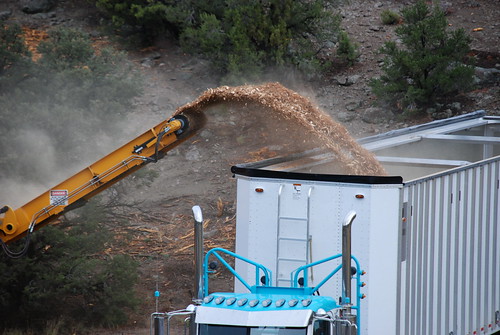
Cross posted from the White House CEQ blog:
Across rural America, biomass like wood pellets and wood chips is helping communities diversify their energy sources, create jobs, and save money on utility bills. At the Forest Service, we are working to support biomass projects that help us manage wildfire threats, and also serve as economic engines for rural communities. Last week, USDA Secretary Tom Vilsack announced grants of $4 million for renewable wood energy projects that will provide 20 small businesses, tribes and community groups with the technical engineering and design services they need to explore installing wood heat and electricity projects.
As a native of New Mexico, and a member of the Mescalero Apache Tribe, I was raised to appreciate the importance of natural resources and the responsibility we all have to care for our lands. This sense of stewardship has been further enhanced by my 27 years in the Bureau of Indian Affairs, as well as my prior experience as New Mexico State Forester, chair of the Council of Western State Foresters, and co-chair of the Western Forestry Leadership Coalition. I understand that improving the condition of our forests will improve economic opportunities for our tribal and rural communities.
The Forest Service is facing challenges associated with drought, wildfire, invasive species and unprecedented outbreaks of insects and disease. In 2012, the Forest Service estimated that between 65 and 82 million acres of national forests and grasslands are in urgent need of restoration -- more than four out of every 10 acres.
Building relationships and longstanding partnerships with tribes, states, private landowners and other stakeholders will help us address the issues facing the landscapes shared by us all – what we call an “all-lands, all-hands” approach. Working collaboratively with our partners, the Forest Service has announced a schedule to boost restoration and thinning programs by 20 percent each year in areas that face the greatest danger of a catastrophic fire. If we can use some of the woody biomass byproducts of these treatments for heat and electricity, we can leverage this restoration even further.
One of the grants we recently announced will go to Nulato, Alaska, to help the community design a wood-heating system to serve the local school and water plant. This will reduce dependence on costly fuel oil and create local jobs in delivering the wood through local businesses. In Tahola, Washington, the Quinault Indian Nation will design a thermal woody-biomass-fired energy system to serve their community facilities. In Superior, Montana, a wood pellet boiler has the potential to lower energy costs at the Mineral County Hospital’s new critical care center.
The grants build on President Obama’s strong record of supporting rural economies through the White House Rural Council. Established one year ago, the Rural Council has focused on maximizing the impact of federal investment to promote economic prosperity and improve the quality of life in rural communities. You can learn more about the Forest Service’s grant program and work to advance woody-biomass-to-energy projects here.



